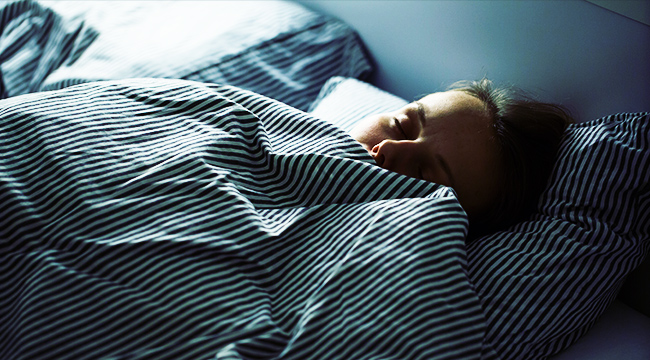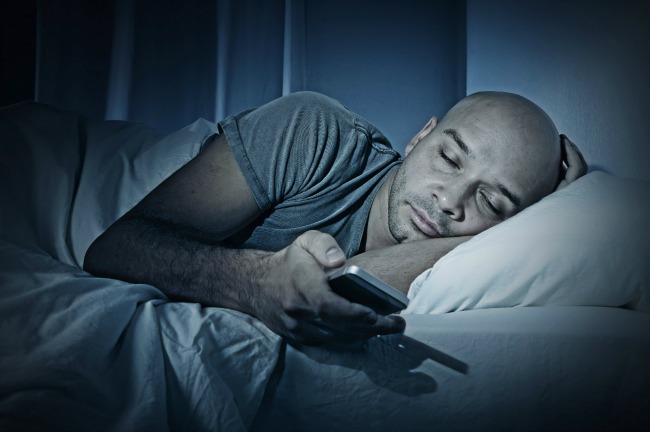
As the nation argues over health care, a revolution is quietly unfolding on Amazon and at your local Best Buy: Fitbits are appearing on wrists, calorie tracking apps are being filled with careful notes about what we’re eating, and sleep sensors are being tucked under mattresses. The optimistic view of all this is that Americans are beginning to take control of their health. But is this a good thing? Or can you drive yourself crazy?
This is a question I found myself forced to ask when I was sent the EarlySense Live sleep sensor to review. The EarlySense is a quite impressive bit of technology, a consumer version of sensors the company sells to hospitals to monitor patients’ vital signs remotely. It’s a flat disc you put between your mattress and boxspring, and it’s surprisingly easy to install. I had it up and running in minutes. Once it’s going, it tracks your sleep patterns, from your breathing rate to your rapid-eye movement, and gives you a giant pile of data about how you’re sleeping in charts and graphs, fed to your phone over Bluetooth in real time. There’s even a convenient “sleep score” to tell you if your sleep habits are getting better or worse over time.
The sleep sensor wasn’t my first foray into employing consumer electronics to get myself into shape. A few years ago, after my wife pointed out that I was kinda fat and she would prefer I not drop dead of a heart attack, I agreed that heart attacks were unpleasant and started using a calorie-counting app and a step counter. I quickly discovered that modern health is uniquely geared to my inner nerd. I have a love of numbers, statistics, and any other form of quantifiable data. The only reason I didn’t have a sleep sensor was that they tended to be bracelets, and I destroy every watch strapped to my wrist. For me, the EarlySense was nerdvana: Charts, graphs, numbers, and data — glorious, glorious data.
The EarlySense tracks everything:. You can see your breathing and heart rate tracked as you sleep. It’ll tell you when you move. You can see how long you sleep. There’s even a chart that tracks you through the phases of sleep. It’s fascinating stuff. One small problem: I found myself being pulled into a vortex of worry. I began tracking my sleep score, and found myself obsessed with raising it, which is actually quite difficult to do when you’re laying awake and wondering if you’re getting enough sleep.
It took me a few days of near-sleeplessness to realize that I had no idea what the heck any of the data I was getting actually meant. Was I getting enough sleep? Was it good or bad that the majority of my sleep was “light sleep?” Was I getting too little “deep sleep?” What the hell was this stuff and what did it mean for my health?
It turns out people who study sleep for a living have the same questions and no answers. For all the yammering about how we’re a sleep-deprived people and how we need a good eight hours of rest, it turns out that, like so much else, it’s up for debate. Researchers studied pre-industrial human societies in the middle of nowhere — essentially people as close to our hunter-gatherer past as you can still find on Earth — and discovered that they didn’t get eight hours of sleep either. Psychologists argue that there are actually a variety of healthy sleeping “styles,” ranging from the monophasic sleep we’ve been taught is best to power naps throughout the day. Roger Ekirch, a historian at the University of Virginia, discovered that between the 15th and 17th century, people used to sleep for a few hours, wake up to goof off for a few more, and then went back to sleep. Ekrich was most arrested by the idea that the source material suggested that everybody knew this, that it was weird if you didn’t wake up, crack a book for a while, and then doze off again.

There’s also plenty of argument over sleep trackers. I wasn’t alone in being trapped in the irony of losing sleep over how well I was sleeping. Research has found that Fitbits, Apple Watches, and other tracking tools found people self-diagnosing themselves with sleep problems they likely didn’t have.
Therein lies the whole problem. The EarlySense is a tool, but it’s a tool that I had no idea how to use. It was as if I’d picked up a few power tools from Home Depot and decided, since I’d spent years living in a house, that I was qualified to build one. The EarlySense didn’t make me a sleep scientist; instead it reminded me that despite the fact I’d been sleeping all my life, I had no idea what healthy sleep was, and to make any use of it properly, I’d have to learn what that meant.
As I get a handle on my own ignorance, though, the EarlySense Live has becomes very handy for me. It’s made me think more clearly about my sleep habits. Being able to see my heart rate and breathing is cool, but it also tells me that I need to chill to actually fall asleep. And when I’ve had a rough sleep week, it’s made me stop goofing off late at night and go to bed. But that only helped once I understood that my “sleep score” wasn’t necessarily a big deal. Sensors, trackers, and apps are great, but they’re only useful if we understand our own limits, first.
